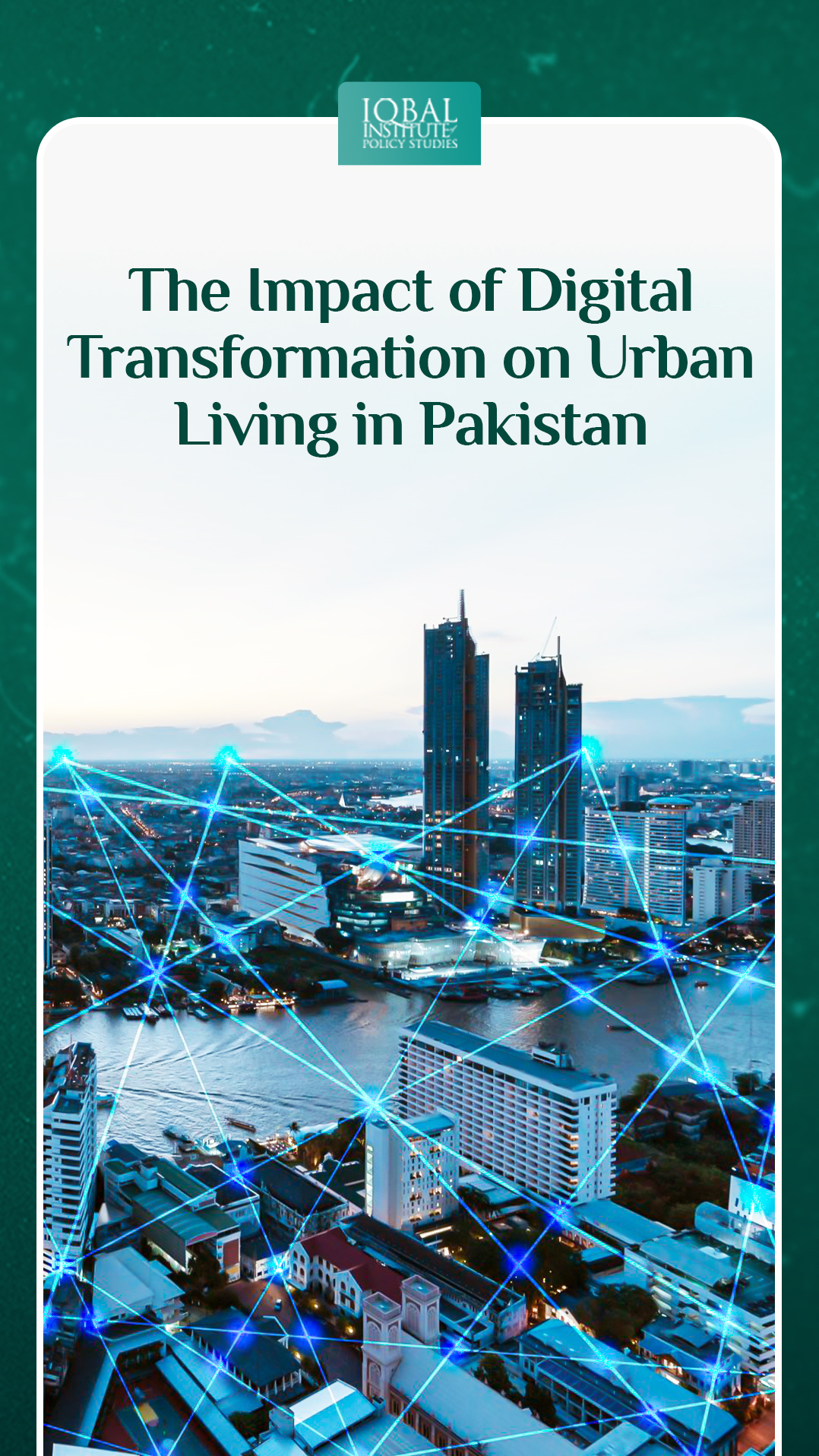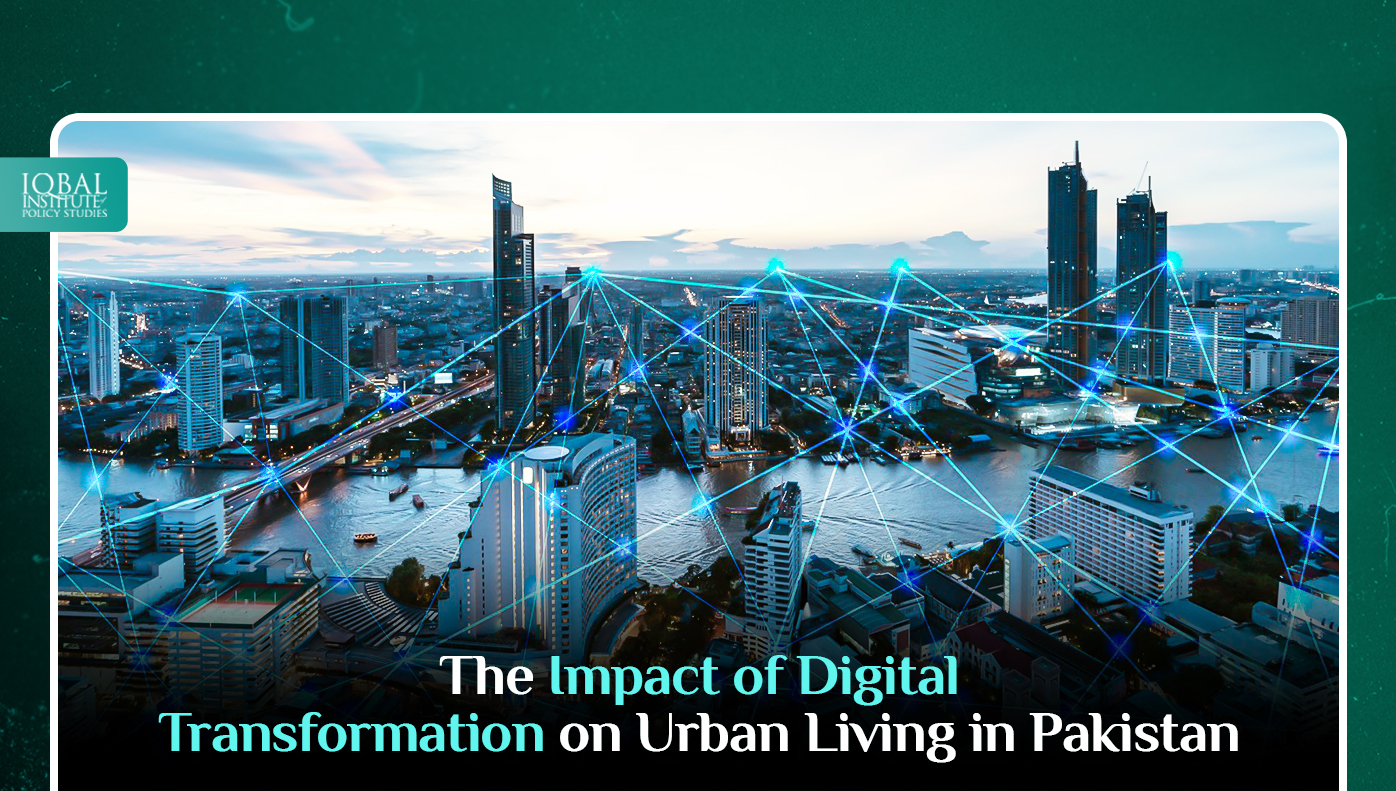Digital technologies have evolved into essential instruments for propelling social development and fostering economic growth. However, Pakistan’s venture into digital transformation has been marked by both promise and challenges. The country benefits from a dynamic youth demographic, creating a conducive environment for leveraging the potential of digital technologies. The widespread use of smartphones, rising internet accessibility, and the rise of tech startups collectively contribute to the swift evolution of Pakistan’s digital and urban landscape. Conversely, the country encounters various challenges surrounding cybersecurity, digital literacy, and the development of robust infrastructure. However, with continued collaboration and forward-thinking initiatives, the nation stands at the precipice of a digital revolution that not only enhances urban living but also paves the way for sustained economic growth and societal well-being. The road ahead involves navigating these challenges judiciously and fostering an environment where technology becomes an empowering force for all residents in Pakistan’s urban landscape.
What is the Impact?
Following are some of the ways digital transformation has impacted urban living in Pakistan.
The Rise of Smart Cities
With the sixth-largest population globally, Pakistan faces a significant challenge in managing overpopulation and ensuring the well-being of its people (Alam et al., 2018). The increasing trend of migration to urban areas adds to the government’s challenges. However, as technology intertwines with the urban fabric, the concept of smart cities emerges as a beacon of progress. From Lahore to Karachi, cities in Pakistan are embracing digital solutions to enhance infrastructure, streamline services, and create more responsive environments. The integration of IoT (Internet of Things) devices and data-driven insights is fostering efficiency in waste management, traffic control, adequate housing, and public safety, paving the way for smarter, more connected urban spaces.
E-Governance and Citizen Services
Digital transformation is not just reshaping physical spaces but also redefining the relationship between citizens and their local governments. E-governance initiatives are simplifying bureaucratic processes, and making services more accessible through online platforms. From paying utility bills to obtaining official documents, the digital realm is empowering citizens to engage with their city administrations seamlessly. Pakistan’s position in the 2020 UN E-Government Development Index (EGDI) was 153rd out of the 193 countries surveyed (Naqvi, 2021).
Urban Mobility Solutions
In the bustling streets of Pakistani cities, the impact of digital transformation on urban mobility is unmistakable. Ride-sharing apps have become integral to daily commuting, offering a convenient and tech-savvy alternative to traditional transportation. The integration of real-time data and mapping services is optimizing traffic flow, providing commuters with dynamic route options, and reducing congestion in urban centers.
Digital Inclusion and Accessibility
The digital revolution is not exclusive; it aims to bridge gaps and foster inclusivity. Initiatives promoting digital literacy are empowering communities, and ensuring that the benefits of technology are accessible to all. From online education platforms to digital healthcare solutions, the digital transformation is unlocking new avenues for education, healthcare, and economic opportunities in urban areas. As of January 2023, Pakistan had 87.35 million internet users, representing a 36.7 percent internet penetration rate. Social media users in the country reached 71.70 million, accounting for 30.1 percent of the population. Additionally, there were 191.8 million active cellular mobile connections, constituting 80.5 percent of the total population (Kemp, 2023).
Economic Impact
The digital economy is burgeoning in the country. Tech startups are reshaping the business landscape, introducing innovative solutions, and creating job opportunities. E-commerce platforms are revolutionizing the retail sector, offering urban residents a diverse array of products and services at their fingertips. The digitalization of financial services is providing newfound financial inclusion, enabling urban dwellers to participate more actively in the formal economy. As per a PwC report, the adoption of digitalization has the potential to boost Pakistan’s GDP per capita by 3-5% over the next three years (Hayat, 2023).
Challenges and Considerations
The transformative impact of digital transformation in urban settings is undeniable, yet it brings forth a set of significant challenges that require careful consideration. Firstly, the issue of digital literacy poses a hurdle as not all residents may have equal access to and proficiency in digital technologies. Addressing this challenge involves implementing comprehensive digital education and training programs to ensure inclusivity. Secondly, cybersecurity emerges as a critical concern, with the increased reliance on digital infrastructure making cities more susceptible to cyber threats. To counter this, robust cybersecurity measures, including advanced encryption and regular audits, must be integrated into the fabric of urban digital systems.
Additionally, the potential for digital transformation to exacerbate existing urban inequalities is a pressing consideration. To tackle this, urban planners and policymakers should adopt an inclusive approach, ensuring that the benefits of digital advancements are distributed equitably across diverse socioeconomic groups. Furthermore, the challenge of data privacy must be carefully managed to build and maintain public trust. Implementing stringent data protection policies and transparent practices will be essential in navigating this intricate landscape. Lastly, fostering collaboration between the public and private sectors, along with active community engagement, is crucial to addressing these challenges collectively and ensuring that digital transformation enhances urban living for all.
The Future Landscape
As we gaze into the future, the integration of emerging technologies such as AI, blockchain, and 5G is poised to further revolutionize urban living. The possibilities are limitless, and the urban landscape is evolving into a dynamic ecosystem where digital innovation shapes a more connected, efficient, and inclusive tomorrow. When maximized, digital transformation has the potential to generate an annual economic value of up to PKR 9.7 trillion (USD 59.7 billion) in Pakistan by 2030 (Access Partnership, 2021).
Conclusion
In the ever-evolving urban landscape of Pakistan, digital transformation is not merely a technological shift; it is a societal evolution. As cities embrace the digital era, the potential to enhance the quality of urban living, foster economic growth, and create more inclusive communities is unparalleled. Navigating this digital frontier requires a strategic and collaborative approach, ensuring that the benefits of technology are harnessed responsibly for the betterment of all urban residents. The future beckons, and in the digital transformation of urban living, Pakistan is at the forefront of innovation and progress.
This article is written by Haneen Gul. Haneen is a research analyst at the Iqbal Institute of Policy Studies (IIPS).



Leave a Reply